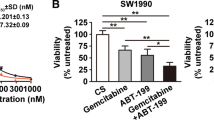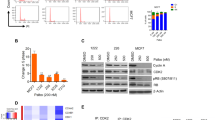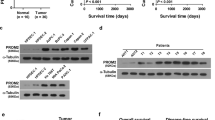Abstract
Background: Gemcitabine is a new nucleoside analogue that produces a clinical response in 30% of patients with unresectable pancreatic carcinoma. The cytotoxic effects of many chemotherapeutic agents occur through induction of programmed cell death (apoptosis), which is controlled by the bcl-2 gene family. We determined whether induction of apoptosis by gemcitabine in pancreatic carcinoma is associated with cellular Bcl-2 content.
Methods: Four pancreatic carcinoma cell lines (MIA-PaCa-2, AsPC-1, Panc-1, and Panc-48) were screened by Western blotting for Bcl-2 protein expression. Dose-response relationships for the cytotoxic effects of gemcitabine were determined using methylthiotetrazole assays, and induction of apoptosis was confirmed by fluorescence-activated cell sorting analysis. MIA-PaCa-2 cells transfected with human bcl-2 were also analyzed for gemcitabine-induced apoptosis.
Results: Pancreatic cancer cell lines expressed varying amounts of Bcl-2, and the 50% lethal dose for gemcitabine-induced apoptosis was correlated with Bcl-2 content. Furthermore, Bcl-2 overexpression was associated with a significant increase in the 50% lethal dose for gemcitabine-induced apoptosis.
Conclusions: Cellular Bcl-2 content was directly correlated with the cytotoxicity of gemcitabine in pancreatic carcinoma. Therefore, routine immunohistochemical analyses may be useful in predicting gemcitabine efficacy, and patients who would likely not benefit could be spared gemcitabine administration. Furthermore, the effectiveness of gemcitabine and other chemotherapeutic agents may be increased by gene therapy-mediated alteration of bcl-2 gene family members.
Similar content being viewed by others
REFERENCES
Fernandez E, La Vecchia C, Porta M, et al. Trends in pancreatic cancer mortality in Europe, 1955-1989. Int J Cancer 1994;57:786–792.
Parker SL, Tong T, Bolden S, Wingo PA. Cancer statistics, 1996. CA Cancer J Clin 1996;46:5–227.
Williamson RC. Pancreatic cancer: the greatest oncological challenge. Br Med J 1988;296:445–446.
Gordis L, Gold EB. Epidemiology of pancreatic cancer. World J Surg 1984;8:808–821.
Abbruzzese JL, Grunewald R, Weeks EA, et al. A phase I clinical, plasma and cellular pharmacology study of gemcitabine. J Clin Oncol 1991;9:491–498.
Casper ES, Green MR, Kelsen DP, et al. Phase II trial of gemcitabine (2′,2′-difluorodeoxycytidine) in patients with adenocarcinoma of the pancreas. Invest New Drugs 1994;12:29–34.
Moore M, Andersen J, Burris H, et al. A randomized trial of gemcitabine versus 5-FU as first-line therapy in advanced pancreatic cancer [Abstract]. Proc Am Soc Clin Oncol 1995;14:199.
White E. Life, death and the pursuit of apoptosis. Genes Dev 1996;10:1–15.
Kerr JFR, Winterford CM, Harmon BV. Apoptosis: its significance in Cancer and Cancer therapy. Cancer 1994;73:2013–2026.
McConkey DJ, Greene G, Pettaway CA. Apoptosis resistance increases with metastatic potential in cells of the human LNCaP prostate carcinoma line. Cancer Res 1996;56:5594–5599.
Krajewski S, Thor AD, Edgerton SM, et al. Analysis of Bax and Bcl-2 expression in p53-immunopositive breast cancers. Clin Cancer Res 1997;3:199–208.
Brambilla E, Negoescu A, Gazzeri S, et al. Apoptosis-related factors p53, Bcl-2, and Bax in neuroendocrine lung tumors. Am J Pathol 1996;149:1941–1952.
Sinicrope FA, Ruan SB, Cleary KR, et al. Bcl-2 and p53 oncoprotein expression during colorectal tumorigenesis. Cancer Res 1995;55:237–241.
Meyn RE, Stephen LC, Milas L. Programmed cell death and radioresistance. Cancer Metastasis Rev 1996;15:119–131.
Reed JC. Regulation of apoptosis by Bcl-2 family proteins and its role in cancer and chemoresistance. Curr Opin Oncol 1995;7:541–546.
Hickman JA. Apoptosis and chemotherapy resistance. Eur J Cancer 1996;32A:921–926.
Hanada M, Aime-Sempe C, Sato T, Reed JC. Structure-function analysis of Bcl-2 protein: identification of conserved domains important for homodimerization with Bcl-2 and heterodimerization with Bax. J Biol Chem 1995;270:11962–11969.
Denizot F, Lang R. Rapid colorimetric assay for cell growth and survival: modifications to the tetrazolium dye procedure giving improved sensitivity and reliability. J Immunol Methods 1986;22:271–277.
Nicoletti I, Migliorati G, Pagliacci MC, Grignani F, Riccardi C. A rapid and simple method for measuring thymocyte apoptosis by propidium iodide staining and flow cytometry. J Immunol Methods 1991;139:271–279.
Introduction of recombinant vectors into mammalian cells. In: Sambrook J, Fritsch EF, Maniatis T, eds. Molecular cloning: a laboratory manual, 3rd ed. Cold Spring Harbor, NY: Cold Spring Harbor Laboratory, 1995:16.30–36.
Lee WY, Jin YT, Tzeng CC. Reciprocal expression of Bcl-2 and p53 in breast ductal carcinoma. Anticancer Res 1996;16:3007–3012.
Kapranos N, Karaiosifidi H, Valavanis C, Kouri E, Vasilaros S. Prognostic significance of apoptosis related proteins Bcl-2 and Bax in node-negative breast cancer patients. Anticancer Res 1997;17:2499–2505.
Matsushima H, Kitamura T, Goto T, Hosaka Y, Homma Y, Kawabe K. Combined analysis with Bcl-2 and p53 immunostaining predicts poorer prognosis in prostatic carcinoma. J Urol 1997;158:2278–2283.
Sinicrope FA, Evans DB, Leach SD, Cleary KR, Fenoglio CJ, Lee JJ, Abbruzzese JL. Bcl-2 and p53 expression in resectable pancreatic adenocarcinomas: association with clinical outcome. Cancer Res 1996;2:2015–2022.
Author information
Authors and Affiliations
Additional information
Supported in part by grants from The University of Texas M. D. Anderson Associates and the American Cancer Society
Rights and permissions
About this article
Cite this article
Bold, R.J., Chandra, J. & McConkey, D.J. Gemcitabine-Induced Programmed Cell Death (Apoptosis) of Human Pancreatic Carcinoma Is Determined by Bcl-2 Content. Ann Surg Oncol 6, 279–285 (1999). https://doi.org/10.1007/s10434-999-0279-x
Received:
Accepted:
Issue Date:
DOI: https://doi.org/10.1007/s10434-999-0279-x




